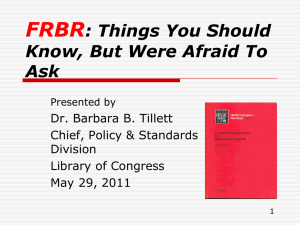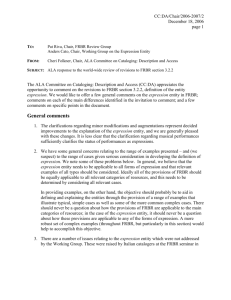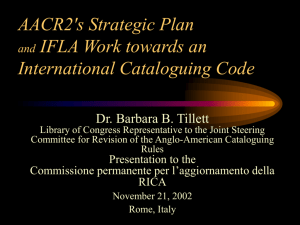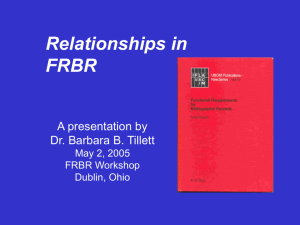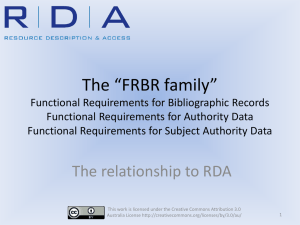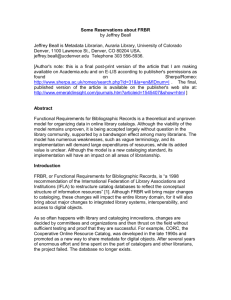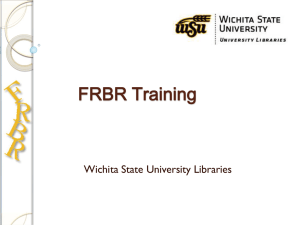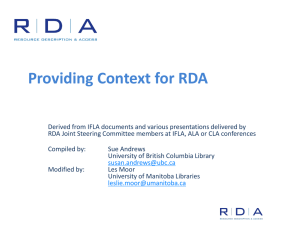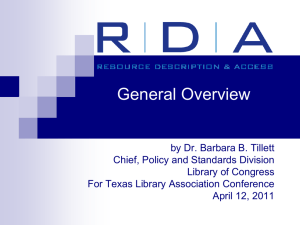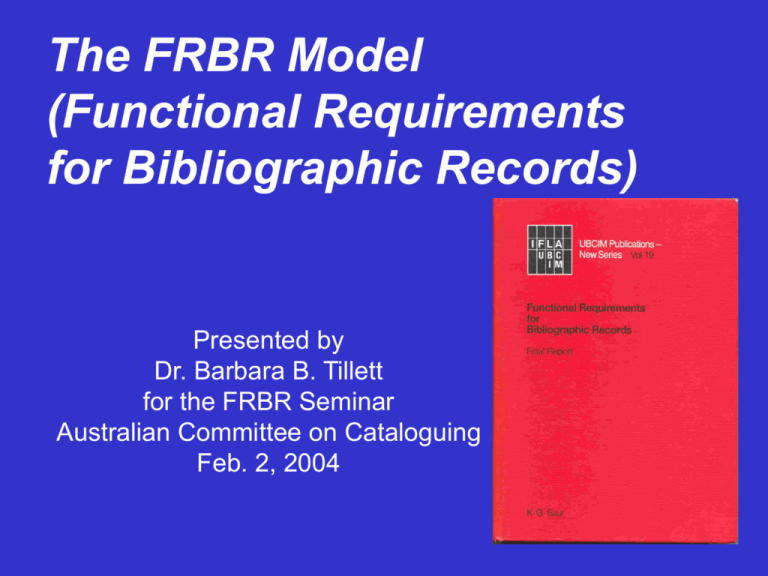
The FRBR Model
(Functional Requirements
for Bibliographic Records)
Presented by
Dr. Barbara B. Tillett
for the FRBR Seminar
Australian Committee on Cataloguing
Feb. 2, 2004
FRBR
• Publisher:
K.G. Saur
• Also available on
the Web:
http://www.ifla.org/VII/s13/frbr/frbr.htm
http://www.ifla.org/VII/s13/frbr/frbr.pdf
FRBR
IFLA Cataloguing
Section’s
Review Group
on FRBR
Web Page:
http://www.ifla.org/VII/s13/wgfrbr/wgfrbr.htm
What Are We Cataloging?
• Library collections
–
–
–
–
–
–
Books
Serials
Maps, globes, etc
Manuscripts.
Musical scores
A-V
• sound recordings
• motion pictures
• photographs, slides
– Multimedia
– “Remote” digital
materials
Entity-Relationship Model
FRBR
• Entities
• Relationships
• Attributes
relationship
Entity 1
Entity 2
FRBR Entities
Group 1: Products of
intellectual & artistic endeavor
–Work
–Expression
–Manifestation
–Item
Vocabulary
• “Book”
–Door prop
(item)
–“publication”
at bookstore
any copy
(manifestation)
Vocabulary
• “Book”
–Who translated?
(expression)
–Who wrote?
(work)
FRBR Entities
Group 2: Those responsible for
the intellectual & artistic content
–Person
–Corporate body
FRBR Entities
Group 3: Subjects of works
–Groups 1 & 2 plus
–Concept
–Object
–Event
–Place
Group 1
Work
FRBR
is realized through
Expression
is embodied in
recursive
one
many
Manifestation
is exemplified by
Item
Modes of Expression
•
•
•
•
•
•
•
•
FRBR
Alpha-numeric
Music notation
Other notation (e.g., choreographic)
Sound
Still image
Moving image
Three-dimensional object
Combinations of above
Joint Steering Committee
for Revision of AACR2 (JSC)
• Task Force on Format Variation
– Work-level citations
– Expression-level citations
• Update AACR terminology to use
FRBR terms:
– Work, Expression, Manifestation,
Item
Work
is realized through
Expression
Intellectual/
artistic content
Physical recording of
content
Manifestation
Item
is embodied in
is exemplified by
FRBR Entity Levels
Work:
Expression:
The Movie
The Novel
Orig.
Text
Transl.
Critical
Edition
Orig.
Version
Manifestation:
Paper
PDF
HTML
FRBR Entity Levels
Work:
Expression:
Manifestation:
Item:
The Movie
The Novel
Orig.
Text
Paper
Copy 1
Autographed
Transl.
Critical
Edition
PDF
Copy 2
Orig.
Version
HTML
FRBR Entity Levels
Family of works
Work:
Expression:
Manifestation:
Item:
The Movie
The Novel
Orig.
Text
Paper
Copy 1
Autographed
Transl.
Critical
Edition
PDF
Copy 2
Orig.
Version
HTML
Group 1 - Relationships
Inherent to the Entities
FRBR
• Work “is realized by” an expression
– Expression “is embodied in” a
manifestation
• Manifestation “is exemplified by” an
item
–Item
Relationships Work/Expression
w1 Charles Dickens’ A Christmas carol
e1 the author’s original English text
e2 a Tamil translation by V.A. Venkatachari
FRBR
“is realized by”
FRBR, p. 59
Relationships Work/Expression/Manifestation
w1 J.S. Bach’s Goldberg variations
e1 performance by Glenn Gould in 1981
m1 recording released on 331/3 rpm sound
disc in 1982 by CBS Records
m2 recording re-released on compact disc in
1993 by Sony
m3 digitization of the Sony re-release as MP3 in
2000
FRBR
Based on FRBR, p. 59
“is embodied in”
Relationships Work/Expression/Manifestation/Item
w1 Lost treasures of the world
e1 the interactive electronic resource
m1 the CD published in 1994 by Follgard CDVisions
i1 first copy held by Calgary Public Library
i2 second copy held by Calgary Public
Library
FRBR
“is exemplified by”
FRBR, p. 60
Work
Relationships
Expression
• Inherent among the
entities
Manifestation
Item
• Content
relationships among
works
Whole-Part
Accompanying
Family of Works
Same
New Expression
Expression
New Work
B. Tillett
Dec. 2001
Whole-Part Relationships
• Components
• Aggregates
Whole-Part Relationships
WORKS WITHIN WORKS
Components/Aggregates
Shape = container/ carrier
Color = content
Part-to-Part Relationships
• Component to component
– Sequential Relationship
– Accompanying Relationship (or
Companion Relationship)
• Dependent
• Independent
Part-to-Part Relationships
WORKS WITHIN WORKS
Components-to-Component
Accompanying Relationships
Sequential Relationships
Shape = container/ carrier
Color = content
Group 1 Entities’ Attributes
• Manifestation
FRBR
• Work
–
–
–
–
ID
Title
Date
etc.
• Expression
–
–
–
–
–
–
ID
Title
Form
Date
Language
etc.
–
–
–
–
–
–
–
–
–
ID
Title
Statement of responsibility
Edition
Imprint (place, publisher,
date)
Form/extent of carrier
Terms of availability
Mode of access
etc.
• Item
–
–
–
–
ID
Provenance
Location
etc.
Relationship vs. Attribute
Work
Created by
Creates
Person
DRAFT FRANAR extension to
FRBR
FRBR
Entities:
Person
Family
Corporate Body
Work
Expression
Manifestation
Item
Concept
Object
Event
Place
December 2003
Name
Identifier
Access Point
Rules
Agency
Possible FRBR applications
Scenario A - Now
Authority
Work/
Expression
Uniform
Title
Bibliographic
Holding
Person
Series
(work/expression)
Uniform
Title
Concept
Manifestation
Item
“FRBR-ized” OPAC Displays
Shakespeare, William, 1564-1616. Hamlet. [Text]
Translation. French. 1770.
“FRBR-ized” OPAC Displays
Shakespeare, William, 1564-1616. Hamlet. [Text]
Translation. French. 1770.
Work
“FRBR-ized” OPAC Displays
Shakespeare, William, 1564-1616. Hamlet. [Text]
Translation. French. 1770.
Expression
“FRBR-ized” OPAC Displays
Shakespeare, William, 1564-1616. Hamlet. [Text]
Translation. French. 1770.
Manifestation
“FRBR-ized” OPAC Displays
Shakespeare, William, 1564-1616. Hamlet. [Text]
Translation. French. 1770.
Item
FRBR-ize MARC records
OCLC’s algorithm
http://www.oclc.org/research/software/frbr/
LC’s display tool
http://www.loc.gov/marc
Scenario B
Person
Authority
Person
Work/
Expression
Uniform
Title
Bibliographic
Holding
Series
(work/expression)
Uniform
Title
Concept
Manifestation
Item
Work
Group 2
Expression
FRBR
Manifestation
Item
is owned by
is produced by
Person
is realized by
is created by
Corporate Body
many
Relationships - Person/Work
w1 The shepheardes calendar
w2 The faerie queen
w3 Astrophel
… etc.
FRBR
p1 Edmund Spenser
“created by”
FRBR, p. 61
Relationships Corporate Body/Expression
e1 a 1980 performance of Allegri’s Miserere
e2 a 1986 performance of Josquin’s Missa
pange lingua
e3 a 1989 performance of Lassus’ Missa
osculetur me
...
FRBR
cb1 The Tallis Scholars
“realized by”
FRBR, p. 61
Relationships Corporate Body/Manifestation
m1 the 1965 publication by Coach House Press
of Wayne Clifford’s Man in a window
m2 the 1966 publication by Coach House Press
of Joe Rosenblatt’s The LSD Leacock
m3 the 1966 publication by Coach House Press
of Henry Beissel’s New wings for Icarus
...
cb1 Coach House Press
FRBR
“produced by”
FRBR, p. 62
Relationships Corporate Body/Item
i1 a copy of the “Penkill Proofs” of D.G.
Rossetti’s Poems printed in August 1869,
with manuscript annotations by the author
i2 a copy of the “A Proofs” of D.G. Rossetti’s
Poems printed in September 1869, with
manuscript annotations by the author
...
FRBR
cb1 Princeton University Library
“owned by”
FRBR, p. 62
Work
has as subject
Work
Expression
Manifestation
Group 3
FRBR
Item
has as subject
Person
Corporate Body
Concept
Object
has as subject
Event
Place
many
Relationships - Subject/Work
c1 Romanticism
w1 Morse Peckham’s Beyond the Tragic
Vision
w2 Romanticism reconsidered, edited by
Northrup Frye
...
FRBR
“is the subject of”
FRBR, p. 63
Objectives of Catalogs
• Cutter’s objectives for the catalog
– Finding - description and access standards
– Collocating - controlled “vocabularies” for
precision of searching
“User Tasks” - FRBR
•
•
•
•
Find (locate and collocate)
Identify
Select
Obtain
• Relate
• Other possible tasks:
– Attribute Royalties to
– Preserve
Objectives of Catalogs
• Finding
– A single specific resource
– All the works and expressions of a person, corporate
body, or family
– All resources on a given subject
– All resources sharing some specific characteristic
• Language, country of publication, date, physical format, etc.
• Collocating
– All resources belonging to the same work
– All resources belonging to the same expression
– All resources belonging to the same manifestation
Collocation by Works
• Shakespeare, William, 1564-1616.
+ All’s well that ends well
+ As you like it
+ Hamlet
+ Macbeth
+ Midsummer night’s dream
Collocation by Family of
Works and Expressions
• Shakespeare, William, 1564-1616. Hamlet.
+ Texts
+ Motion Pictures
+ Sound Recordings
Collocation by Expressions
• Shakespeare, William, 1564-1616. Hamlet.
+ Texts – Danish
+ Texts – Dutch
+ Texts – English
+ Texts – French
+ Texts – Spanish
+ Motion Pictures – English
+ Sound Recordings - English
Collocation of Manifestations
• Shakespeare, William, 1564-1616. Hamlet.
- Motion pictures – English
+ 1964
+ 1990
+ 1990
+ 1992
+ 1996
+ 2000
Director, Bill Collegan
Director, Kevin Kline, Kirk Browning
Director, Franco Zeffirelli
Director, Maria Muat
Director, Kenneth Branagh
Director, Campbell Scott, Eric Simonson
Where is FRBR most useful?
• Classics of literature vs. scientific studies
• Examples in the OCLC database
– Stephen King
• 102 works, 231 manifestations
– Shakespeare’s Hamlet
• 1 work, 2696 manifestations
– Rowling, J.K. (Harry Potter stories)
• 28 works, 300 manifestations
FRBR Applications
• Related models:
– <indecs>
– ABC model in
Project Harmony
(US, UK, Australia)
– Indiana Univ.:
Variations2 digital
music
• Applications:
– Denmark: VisualCat
– Australia: AustLit
– VTLS and Innovative
Interfaces Inc.
• : Virtua’s “FRBR-ized” catalog
– OCLC’s Fiction Finder;
future WorldCat
– RLG’s Web union catalog
plans and their experimental
RedLightGreen
International Code for
Bibliographic Description and
Access
• IFLA Conferences
2003+
• Collaboration with
ICA, ISO, DC, W3C,
etc.
• Goal = Collaborative
use in multiple
environments
– consistency
– trust
– authority
FRBR futures
• Terminology
• Concepts
– Entities
– Relationships
– Attributes
• Goals of
bibliographic control
– Finding
– Collocating
Thank you!
•
Slides 14, 25, 27 and a modified
version of 23 were published in
Barbara B. Tillett, “Bibliographic
Relationships.” In Relationships in
the Organization of Knowledge,
edited by Carol A. Bean and
Rebecca Green, 19-35. Dordrecht:
Kluwer Academic Publishers,
2001.
© 2001 All Rights Reserved.
If these images are reused, please
include this citation.

